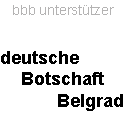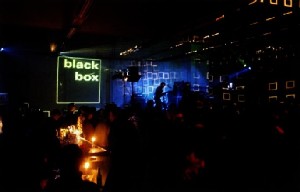bbb 2005 topic
film festival
artists in residence
program
>> download program (pdf 160kb)
bbb topic 2005: "Turbocultures - the Balkans between archaism and postmodernity"
Under this topic bbb2005 offers a program of interdisciplinary events which are understood as a crtitique of the topic at hand. Thus the festival reacts to the existence of the rather long-term and deep divisions in ideology and culture within Southeast European Societies.
The two-culture theory: When Stipe Mesic emerged victorious from Croatia's Presidential elections in 2000, formally bringing to an end the era of the late autocrat Franjo Tudjman, one politician reacted by commenting: "Rock beats Folk".
Even before the ideological bipolarity within the USA became apparent, we have known of the "two cultures" within present-day societies. This has recently been discussed, for example, both by cultural theorist Andrea Zlatar (in relation to Croatia) and the author D. Schneider (in relation to the USA). What we mean, is easier meant than said, because the old contrast of "Midwest-redneck" or Balkan backwardness and a universally-civilized development, as it is usually linked to urbanisation and modernisation, is unfortunately suitable for election campaigns, but often remains an uncritical simplification of social realities. The Balkan "war against urbanity" identified by Bogdan Bogdanovic in 1992 in the context of the disintegration of Yugoslavia appears as the culminating point of an antagonism that never in fact existed. The in-depth structure of a rural aggressor identified by Bogdanovic was primarily nourished and developed by cliques of urban literati. Thus rural Serbism only became the idol of nationalist megalomaniacs once it reached the city, along with the wave of the naïve, the natural, the folkloristic, which became a formative style in the art, music and film of the new old successor states of Yugoslavia.
bbb film festival: Competition, panorama, focus
For the second time, the film festival within the balkan black box festival is the venue for the "golden black box" competition in the categories of fiction, documentary and short film. More than 10 recent feature films, 15 documentaries, and an uncounted number of short films are taking part. Moreover, the festival offers a review of films produced within the last years, as well as specific films reflecting on the festival topic "Turbo-culture – the Balkans between archaism and postmodernism".
bbb artists in residence 2005: Sila (Belgrad)
"Neocekivana Sila Koja Se Iznenada Pojavljuje I Resava Stvar" ("The unexpected power that appears surprisingly and solves the problems") are one of the living legends of Belgrade's music scene. Sila have the iron will to experiment: Whether it is their psychedelic sound-scapes that accompany Pobert Wiene's mute film "The Cabinet of Dr. Caligari" (Wed, 16.11), their musical combat against the cultural adversary "turbo folk" (Sat, 20.11.), or their excessive pure style (Wed, 23.11), Sila impresses with an unpredictable mix of intuition, muscle power, and intelligent use of machines. R'n'R tradition, break beat, trip hop, and techno.
Wednesday, 16.11.05, 6.00 pm babylon berlin:mitte
Art opening "Nadezhda, Svoboda, Druzhba, Mladost"
photographs and interviews by Luise Schröder
Nadeshada, Svoboda, Druzhba, Mladost (hope, freedom, friendship, youth) are four modern estates in Sofia. In a double series Luise Schröder portrays young people living there - the youths and their rooms, complemented by interviews. Schröder provides a substantial insight into the heterogeneous prospects and self-images of Bulgaria's first young generation after the fall of communism.
Wednesday, 16.11.05, 8 pm babylon berlin:mitte
Film concert: Sila (Belgrade) and "The Cabinet of Dr. Caligari" (Robert Wiene, G 1919) Opening of the festival
Caligari, a hypnotist and actor, makes his somnabule medium Cesare kill several people. Demasked by a student named Francis, he turns out to be an inmate of a mental hospital, the director of which is Caligari himself. One of the most famous German mute films and a master piece of expressionism, presented in a musical re-arrangement by Sila, avant-garde electro rockers from Belgrade, and "artists in residence" of bbb 2005.
Thursday, 17.11.05, 10 pm, Brunnenstr. 10
Festival Opening "Zoom In: Bulgaria"
Prelude to this year's regional focus, featuring Vataff Project (ethno trance), DJs Rumbata feat. Dessylee (cultural combat of tchalga vs. hiphop), Ljuteniza - songs from Bulgaria, sound-interviews by Luise Schröder and Raliza Nikolowa, and short films
"Vataff Project" stands for an exciting mix of traditional Bulgarian instrumental music and progressive electronics. Fond of breaks in style, they oppose Bulgarian mainstream. Ljuteniza, on the other hand, present the fascinating tradition of Bulgarian womens' choirs.
Friday, 18.11.05, 6 pm, Tacheles, 5th floor
Workshop "give and take, steal and mutate - Appropriation of the city between identity politics and Art of Survival" with: Azra Aksamija (Bosnia and Herzegovina / USA), Veselin Gatalo (Urban Movement, Bosnia and Herzegovina), Julia Hartmann (Sofia / London)
Whether by means of identity politics or individual occupation of city space - in Southeast Europe cities are being taken in possession and colonized in a specific manner. The most diverse operators and networks are involved, ranging from nationalistic elites and commercial enterprises to Roma-families or market-women. The city is therefore increasingly characterized by private agendas, while, due to the decomposition of communes, making out a "social interest" is becoming more difficult.
Workshop in Engl. language, application requested
Friday, 18.11.05, 10 pm Mudd Club Berlin
Concert "Electric Gipsy Disco Noise" (ElGiDiNo, Berlin), Balkanbeats
ElGiDiNo (Electric Gipsy Disco Noise) are notorious for their unsentimental re-interpretation of renowned gipsy- and Balkan melodies, which occur in radical noise costumes. The rhythmically strong program is enriched by stage presentations, seemingly reminiscent of their past at the Berliner Metropol Music Theatre, before the legendary BalkanBeats take over the night.
Saturday, 19.11.05, 6 pm Volksbühne, Roter Salon
"Turbo-Culture. A Radioshow"
Turbo-folk lesson - introduction in the phenomenon of Serbian turbo-folk (stars, protagonists, texts, and videos) with Dusan Maljkovic (Belgrade)
Discussion: "Turbo-Culture - Product of Globalization or Nationalism?" with: Rastko Mocnik (Ljubljana), Viktor Marinov (Sofia), Dusan Maljkovic (Belgrade)
In the countries of Southeast Europe, (cultural) division of societies is often demonstrated by the opposition of pop-folk as turbo (YU) / Chalga (BG) / Manele (RO), on the one hand, and contemporary urban music styles, such as rock, electronic music etc. on the other. The genre of pop-folk is seen as a "threat to civilization" which is directly linked with social-political relations of dominance.
Saturday, 19.11.05, 10 pm Volksbühne, Roter Salon
Concert Turbo-Sila: „The Turbo-Folk that never happened"
on-site experiment with Sila (Serbien) feat. scratchmaster Uce
Specially for the event "turbo-culture. radio show", the avant-garde electronic rockers of Sila venture on an unique experiment - "The Turbofolk That Never Happened". With this music they aim to show how the disputed style could have developed from a strictly urban perspective.
Saturday, 19.11.05, 9 pm Volksbühne, "3rd floor"
Premiere "Belgrade-Berlin" directed by Predag Kalaba (Belgrade / Berlin)
"Belgrade Berlin" describes a train journey between parting and new beginning in the Balkans. A young couple meets on the station of Belgrade, its last stop is Berlin. The Serbian director Predrag Kalaba, who lives in Berlin, confronts this "travel literature" with the lonely island "Ada Medjica" within Belgrade. A co-production of "parasit im 3. Stock" and bbb 2005. Shows also on 20. and 23.11. , 9pm respectively.
Sunday, 20.11.05, 5 pm Tacheles, 4. floor
Vivisect - "War on the Territory of the Former Yugoslavia – View from Inside and Outside" (Finissage)
90 photos by 15 photo journalists about the wars in former Yugoslavia 1991-2001. The controversial reactions of the visitors at the opening in Novi Sad (Serbia) in 2004 proved that the acknowledgment of the past is still difficult. Finissage with curator Marija Gajicki and guests.
Sunday, 20.11.05, 7 pm Volksbühne, Roter Salon
balkan black book - poetry from Southeast Europe, with Bora Cosic (Belgrade/Berlin), Miglena Nikolchina (Sofia), Ana Seferovic (Belgrade), Tzveta Sofronieva (Sofia/Berlin)
In the Balkans, no other cultural genre has experienced such a Renaissance in the last years, as literature has. Authors of three generations, with different orientations and geographical detections, speak about coming to terms with the past, parting and new start, and, not least, about the debate over linguistic development with regard to tradition and innovation.
Monday, 21.11.05, 6 pm Cinema Nickelodeon
Film discussion: „War for Peace – Part One", directed by Koca Pavlovic (present)
Pavlovic's film, showing Montenegro's participation in the campaign against Dubrovnik, was supported by Montenegro's TV, but has never been released: It portrays the positions of former and present politicians of Montenegro critically. Nonetheless, its existence has led to a passionate debate about the (im)possibility to cope with the recent past of the country. In presence of the director.
Monday, 21.11.05, 8 pm Kinski Bar Neukölln
Almir Mustafic "Fugazzi" (Vernissage)
Fuggazi (Italian) means 'fake diamond'. Diamonds are forever, while pictures presented by the media are not. Mustafics wireframe-aesthetics "rescues" and processes everyday photos and turns them into something remaining.
Tuesday, 22.11. 05, 7.30 pm Volksbühne, Roter Salon
"Reinigungskraft Live" ("Cleaner Live"), performance, R: Branko Simic (Hamburg), text, music: Ratko Danilovic (Hamburg), with: Timur Cirak, Alexandra Despotovic, Branko Simic, Ratko Danilovic; aftershow: Papa Joe, Globalution
The play is based on autobiographical material of the musician and performer Ratko Danilovic, who was working as cleaner for three and a half years. Danilovic enters a fictious dialogue with those who usually work in the now empty offices. Although he has never met anyone, he developes images and biographies of those people. A synthesis of theatre, performance, documentary and music. With friendly support by Cujic Gebäudereinigung GmbH
Wednesday, 23.11.05, 8 pm Münz Klub
10 years after Dayton - An "anti-resume" from literary and artistic perspective (to be confirmed)
panel discussion with Dubravka Ugresic, Zoran Terzic, and others.
The Dayton Agreement, which marked the end of the war in Bosnia, has its 10th anniversary in 2005. Records and resumes that deal with the war-torn break-up of Yugoslavia have mostly targeted political, economic, historical, or legal explanations so far. Therefore, the panel discussion will focus on the view of contemporary artists on the consequences of war and nationalism, which still shape post-Yugoslav societies, and ways of dealing with it. An event by Bildungswerk Berlin of the Heinrich-Böll Foundation.
Wednesday, 23.11.05, 10 pm Pfefferberg, Haus 13
bbb show-down:
Sila (Belgrade electro rock), DJ Gordan Paunovic (B92 Belgrade), "Projections of Trans-European exoticism"
Sila - liva and undisguised. At the end of the festival, the band reveals its face and appears as the progressive dance derivate of rock and break beats, Sila usually stands for. Images of trans-European exoticism, meanwhile, show the clichés of the Balkans at their best: Village life without stench and dirt, the "Great Slavic soul" - unlimited grief, shoreless reconciliation, and the bloody here and now. Thus the festival finds its culmination, focus, and finale of this year's topic "turbo-culture - the Balkans between archaism and postmodernism."


